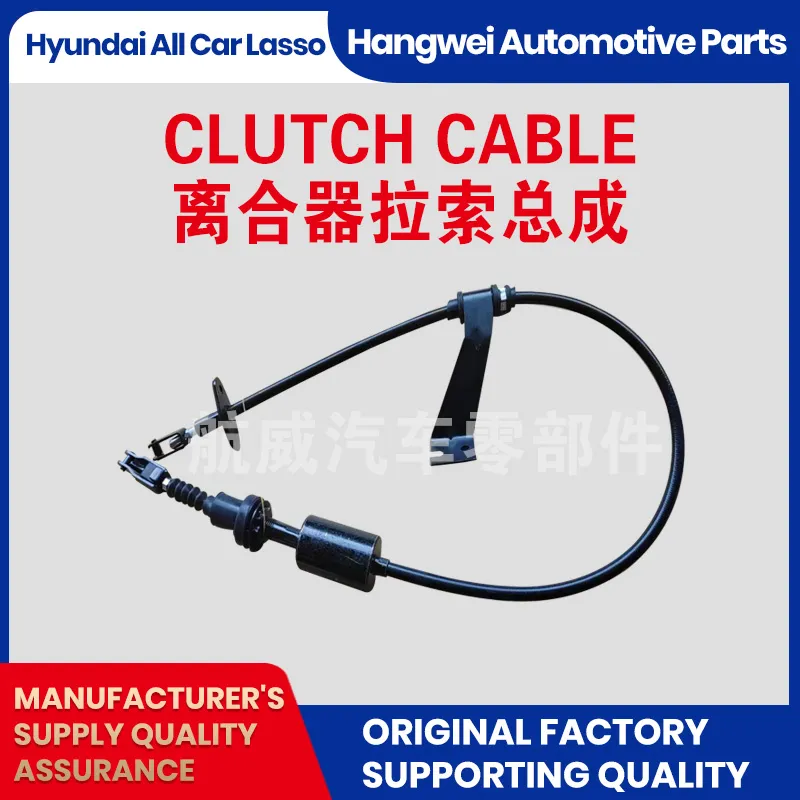master cylinder clutch line
Understanding the Master Cylinder Clutch Line Function, Maintenance, and Troubleshooting
The master cylinder clutch line is a vital component in a vehicle's hydraulic clutch system, playing an essential role in the seamless engagement and disengagement of the clutch. The hydraulic system, which relies on fluid mechanics for its operation, is designed to provide smoother gear shifts and improved driving performance. In this article, we will explore the function of the master cylinder clutch line, its importance in a vehicle, maintenance tips, and common issues that may arise.
Function of the Master Cylinder Clutch Line
The master cylinder is a hydraulic component that converts the mechanical force exerted by the driver's foot on the clutch pedal into hydraulic pressure. This pressure is transmitted through the clutch line to the slave cylinder, which then engages or disengages the clutch mechanism. Essentially, when you press the clutch pedal, the master cylinder pushes hydraulic fluid through the clutch line, which activates the slave cylinder to release the clutch disc from the flywheel, allowing the driver to change gears smoothly.
The hydraulic system offers significant advantages over traditional mechanical linkages, such as reduced pedal effort and improved responsiveness. This design minimizes the likelihood of clutch grab and allows for finer control during gear shifts, enhancing overall driving comfort.
Importance of the Master Cylinder Clutch Line
The master cylinder clutch line contributes significantly to a vehicle's performance and safety. A properly functioning hydraulic system ensures reliable clutch operation, which is crucial for effective gear changes. If the master cylinder or the clutch line develops issues, it can lead to various complications, including difficulty shifting gears, clutch slippage, and even complete clutch failure. Therefore, understanding the importance of maintaining this system is essential for any vehicle owner.
Maintenance Tips
To ensure the longevity and reliability of the master cylinder clutch line, regular maintenance is necessary. Here are some tips to keep your hydraulic clutch system in prime condition
1. Check Fluid Levels Regularly Hydraulic systems are fluid-based, so it's essential to monitor the hydraulic fluid levels in the reservoir. If the fluid level is low, it may cause air to enter the system, leading to clutch disengagement issues.
2. Inspect for Leaks Regularly check the master cylinder, clutch line, and slave cylinder for any signs of fluid leakage. Leaks can lead to a loss of pressure and adversely affect the functioning of the clutch.
master cylinder clutch line

3. Bleed the Clutch System Air bubbles in the hydraulic system can cause inefficient clutch operation. If you notice sponginess in the clutch pedal, it may be time to bleed the system to remove trapped air.
4. Replace Worn Components Over time, components of the master cylinder and clutch line may wear out. Regularly inspect for signs of wear, such as cracks or fraying, and replace these parts as necessary.
5. Maintain Proper Fluid Use the recommended type of hydraulic fluid for your vehicle. Using the wrong type of fluid can compromise the system’s performance and lead to premature failures.
Common Issues and Troubleshooting
While regular maintenance can reduce the likelihood of issues, problems can still arise. Here are some common issues related to the master cylinder clutch line and their potential solutions
- Soft or Spongy Clutch Pedal This could indicate air in the system or low hydraulic fluid levels. Bleeding the system and topping off the fluid may resolve the issue.
- Difficulty Shifting Gears This could be due to a malfunctioning master or slave cylinder or even a worn clutch disc. Inspecting and possibly replacing these components may be necessary.
- Fluid Leaks Identifying and fixing any leaks in the master cylinder or lines is essential to restore proper function. If the leak is significant, it may be necessary to replace the entire assembly.
- Unresponsive Clutch If the clutch fails to disengage, check for possible hydraulic problems, including obstructions in the clutch line or failure of the master cylinder.
Conclusion
The master cylinder clutch line is a crucial aspect of a vehicle’s hydraulic clutch system, directly affecting the performance and safety of your car. By understanding its function, performing regular maintenance, and addressing issues promptly, drivers can enjoy a smooth and responsive driving experience for years to come. A little attention to this often-overlooked component can go a long way in preserving the integrity and efficiency of your vehicle's clutch system.
-
Workings of Clutch Pipe and Hose SystemsNewsJun.04,2025
-
The Inner Workings of Hand Brake Cable SystemsNewsJun.04,2025
-
The Secrets of Throttle and Accelerator CablesNewsJun.04,2025
-
The Hidden Lifeline of Your Transmission Gear Shift CablesNewsJun.04,2025
-
Demystifying Gear Cables and Shift LinkagesNewsJun.04,2025
-
Decoding Clutch Line Systems A Comprehensive GuideNewsJun.04,2025
